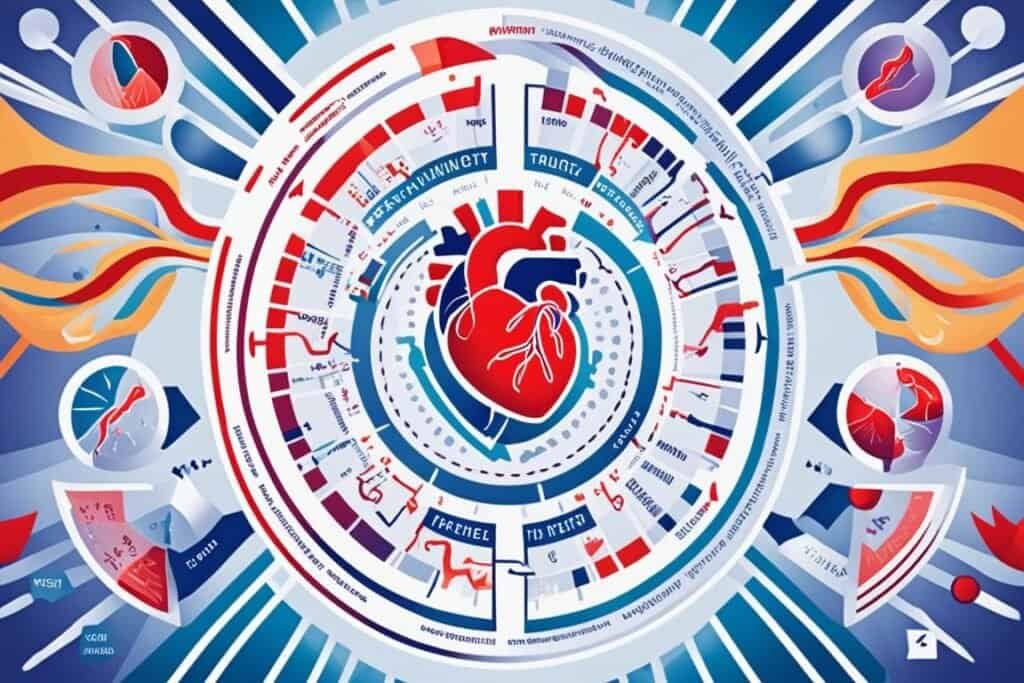Recognizing the signs of a potential heart issue is crucial for maintaining your cardiac health. While some symptoms may raise red flags, it’s important to be aware that not all heart problems come with clear warning signs. In this article, we will explore the various signs and symptoms that may or may not indicate trouble with your heart.
When it comes to heart health, it’s essential to be vigilant and proactive in monitoring your body for any cues pointing to potential issues. Identifying these signs early on can help you seek appropriate medical attention and take necessary steps to address any potential heart-related problems. It’s important to note that individual experiences may vary, and not everyone will exhibit the same symptoms.
Key Takeaways:
- Not all heart problems come with clear warning signs
- Common signs of a heart issue include chest pain, shortness of breath, and fatigue
- Other symptoms such as upset stomach, pain in the throat or jaw, weakness, and persistent cough may also indicate a heart problem
- If you experience any signs or symptoms of a heart issue, it’s important to seek medical attention
- Don’t ignore any changes in your heart health, especially if you have risk factors
Chest Pain: A Possible Sign of Heart Trouble
One of the most common warning signs of a heart issue is chest pain. It can be a cause for concern as it may indicate poor blood flow to the heart or even a heart attack.
When experiencing chest pain, it’s important to pay attention to the sensations you’re feeling. It can vary in intensity and may manifest as pressure, tightness, or a burning sensation in the chest. The pain may also radiate to other parts of the body, such as the neck, arms, stomach, jaw, or upper back.
Chest pain associated with angina often occurs during physical activity or in moments of emotional stress. However, it typically subsides with rest or the use of nitroglycerin medication.
It’s crucial to distinguish between chest pain caused by heart issues and pain resulting from other causes, such as indigestion or muscle strain. If you experience chest pain and suspect it might be related to your heart, it’s important to seek medical attention promptly to ensure proper evaluation and appropriate treatment.

Remember, chest pain can be a significant indicator of potential heart problems. If you’re unsure about the cause of your chest pain or if it is accompanied by other symptoms like shortness of breath or lightheadedness, don’t ignore it. Seeking medical advice can help you determine whether your symptoms are related to your heart health or if there’s another underlying cause. Taking action and addressing potential heart problems promptly can be life-saving.
Shortness of Breath and Fatigue: Warning Signs of Heart Problems
Shortness of breath and extreme fatigue can be indicators of heart problems. When the heart doesn’t pump enough blood to meet the body’s needs, it can result in shortness of breath during activity or even at rest. This can make simple tasks like climbing stairs or carrying groceries feel more challenging than usual.
Fatigue may be a sign that the heart isn’t functioning properly. If you find yourself feeling unusually tired and drained, especially if it’s severe or interferes with daily activities, it’s important to pay attention to this symptom. Fatigue caused by heart issues may not improve with rest and can persist for days or weeks.
These symptoms should not be ignored, especially if they occur alongside other signs of a heart issue. If you experience shortness of breath, extreme fatigue, or a combination of these symptoms, it’s important to seek medical attention. Your doctor can evaluate your symptoms and determine if further evaluation is necessary.
| Shortness of Breath | Fatigue |
|---|---|
| Feeling breathless during physical activity | Feeling unusually tired and drained |
| Difficulty catching your breath after exercise | Lack of energy to perform daily tasks |
| Struggling to breathe even at rest | Fatigue that lingers for days or weeks |
Other Potential Heart Issue Symptoms
In addition to chest pain, shortness of breath, and fatigue, there are other symptoms that may signal a heart issue. It’s important to pay attention to these symptoms, especially if you have risk factors for heart problems. Some of these red flags for heart conditions include:
- An upset stomach or indigestion
- Pain or pressure in the throat or jaw
- Unexplained weakness or fainting
- Loud snoring or gasping during sleep
- Breaking out in a cold sweat
- Persistent cough or wheezing
- Swelling in the legs, ankles, or abdomen
- Palpitations or an irregular heartbeat
It’s important not to ignore these signs of possible heart problems. If you experience any of these symptoms, particularly in combination with other heart health signs, it’s crucial to seek medical attention promptly. Early detection and intervention can make a significant difference in managing heart conditions and improving overall cardiac health.

Note: This image is for illustrative purposes only and does not depict any specific heart condition or symptom.
How to Take Action and Seek Medical Attention
If you experience any signs or symptoms of a heart issue, it’s important to take action and seek medical attention. Your health should always be a priority. If you notice any of the following heart disease warning signs, indicators of potential heart ailments, or signs of cardiac health concerns, it’s crucial to act promptly:
- Chest pain
- Shortness of breath
- Extreme fatigue
- Any other symptoms that concern you
If you have any of these warning signals for heart issues, it is recommended to call your doctor for guidance. They can evaluate your symptoms and provide necessary advice. Additionally, if you have risk factors or if the symptoms are severe, don’t hesitate to call 911 or go to the nearest hospital. Remember, it’s better to be safe and have a medical professional assess your condition.
Conclusion
Recognizing the signs and symptoms of heart issues is crucial for maintaining your cardiovascular health. While some symptoms may seem mild or easy to dismiss, it is essential to pay attention to any changes in your overall well-being. Particularly if you have risk factors such as age, overweight, diabetes, high cholesterol, or high blood pressure, being aware of cues pointing to heart-related problems is even more critical.
If you experience any warning signals for heart issues, such as chest pain, shortness of breath, extreme fatigue, or any other heart health signs, it is important not to ignore them. Seeking medical attention promptly will help ensure early detection and intervention if needed. Remember, taking action sooner rather than later can make a significant difference in the outcomes of potential heart problems.
Your heart health is of utmost importance. By staying vigilant and proactive in acknowledging and addressing the signs of possible heart problems, you can safeguard your cardiovascular well-being. Stay informed, prioritize self-care, and make regular check-ups a part of your heart-healthy routine. Take control of your heart health, because prevention and early intervention are key to leading a long and healthy life.

